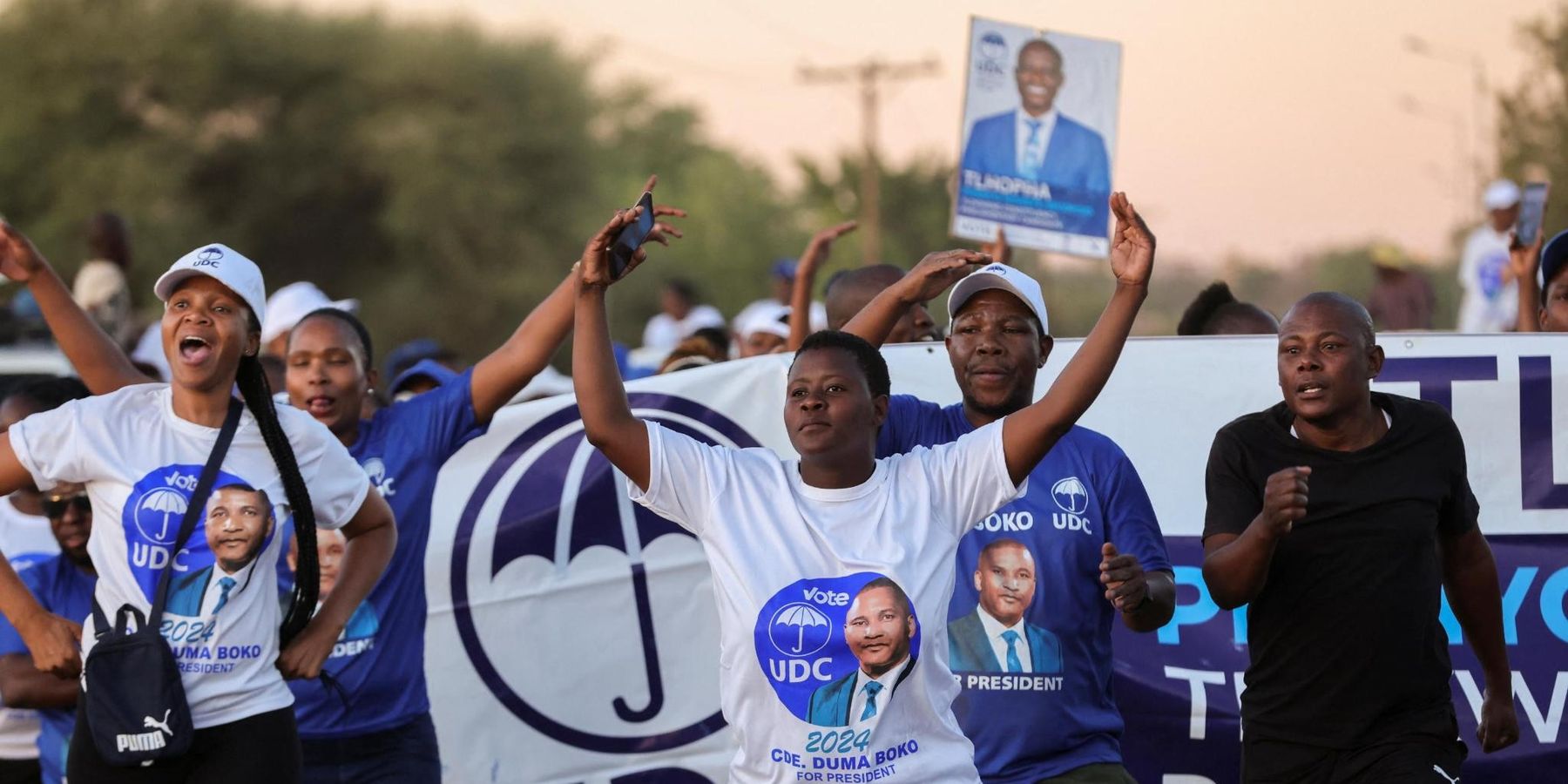In a stunning result that ran counter to much of the pre-election analysis and expectations, the Botswana Democratic Party (BDP), which had ruled Botswana since the country’s first post-independence election in 1966, lost its parliamentary majority in last Wednesday’s elections by a landslide.
The long-ruling party won only four of the 61 seats in the National Assembly, down from the 38 it won in the last general election five years ago.
The main opposition party, the Umbrella for Democratic Change (UDC), won 32 seats, surpassing the 31 needed to secure a governing majority. Under Botswana’s constitution, the majority in parliament elects the president. As a result, the UDC’s leader, Duma Boko, has ascended to the presidency, taking the place of the BDP’s Mokgweetsi Masisi, who resigned after more than seven years in power.
The election results evince the impressive growth of support in the relatively short history of the UDC, which was formed by a coalition of parties in 2012 to challenge the ruling BDP. In the latest election, the UDC ran in direct opposition to the BDP, arguing that the long-ruling party had repeatedly failed to deliver for the 2.5 million people of Botswana on issues ranging from the economy to healthcare, made worse by allegations of corruption.
Although much of the analysis heading into election day suggested that the BDP would almost certainly extend its nearly six-decade rule, it is now clear that the UDC’s arguments for a change in government resonated deeply with the people.
Botswana’s economy has faltered in recent years. The country’s relationship to the global economy is heavily dependent on diamond exports, which account for 80 percent of the country’s total exports. As the natural diamond market has suffered from a drop in global demand, in part due to the rise of lab-grown synthetic diamonds, the country has seen its premier industry shrink. The drop in global diamond demand is a major reason for the country’s drop in GDP growth, which fell from 5.5% in 2022 to 2.7% last year.
As the economy has slowed, a growing number of Batswana have struggled to find work. Unemployment in the country has risen to 27%, hitting young people particularly hard.
The ruling BDP’s reelection efforts were also hurt by internal divisions. Ian Khama, the son of the country’s first president and Masisis’s predecessor (Masisi served as Khama’s vice president), publicly criticized Masisi over a number of policy issues and accused him of authoritarian tendencies.
In the end, Khama formed a breakaway party, the Botswana Patriotic Front, which won four seats in Wednesday’s elections, equalling the number of seats won by the BDP.
The UDC released a manifesto in early September that listed its priorities, focusing heavily on improving the economy and providing new government services to Batswana. It argued that the country had to diversify its economy and pledged to add 450,000 to 500,000 jobs within the next five years, in part through investment in infrastructure projects.
The party says it will look to sectors such as agriculture, agro-processing, solar energy, and tourism as alternatives to diamond production in the years to come.
It also promised to raise the minimum wage, provide access to free internet across the country in government and community centers, and create a comprehensive healthcare system for citizens and permanent residents.
Although the country has fared quite well in global corruption surveys — especially when compared to other African states — there has been a growing perception in recent years that corruption, including nepotism, has increasingly creeped into government operations. Masisi reportedly gave a government contract worth 84 million Botswana Pula ($6.28 million) to his sister in 2022. Although such a contract alone doesn’t necessarily serve as an example of nepotism, it was widely perceived as such.
Masisi was also accused of bypassing judicial processes by interfering in local tribal land disputes.
Although stunning by themselves, Botswana’s election results are consistent with a pattern across southern Africa, in which leading and long-governing parties are struggling to retain their grip on power against a torrent of cries of corruption and weak economic performance that has successfully propelled opposition parties to grab a greater share of power.
South Africa’s African National Congress (ANC), which had secured a governing majority in every election since the end of apartheid in 1992, lost its majority in parliament earlier this year for the first time in its history, forcing it to form a coalition government.
Growing support for opposition parties in Tanzania ahead of last month’s local elections and next year’s general elections, has provoked a major crackdown against opposition protesters in recent weeks, leading to charges of human rights abuses committed by police. Among those detained in the protests have been leaders of the main opposition party, Chadema.
Namibia is similarly experiencing growing calls for a change in government. The South West Africa People's Organization (SWAPO), which has ruled the country since independence in 1990, fell below a two-thirds parliamentary majority in 2019 for the first time and is facing a strong challenge from numerous opposition parties in elections scheduled for November 27.
In addition to Namibia, Tanzania will hold local elections later this month and general elections next year.
These trends evince the political consequences of rising distrust among the public in countries across southern Africa. Citizens are increasingly distrustful of political elites and long-established ruling parties, which are widely seen as having failed to promote the wellbeing of all citizens, instead pushing policies that have contributed to economic stagnation, maintained social inequity, and worsened environmental conditions.
















